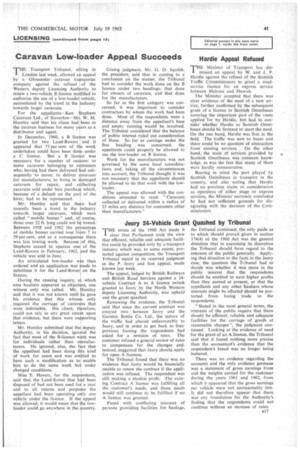Jeory 24-Vehicle Grant Quashed by Tribunal THE terms of the 1960 Act made it
Page 43

If you've noticed an error in this article please click here to report it so we can fix it.
clear that Parliament took the view that efficient, reliable and adequate facilities could be provided only by a transport industry which was, to some extent, protected against competition, the Transport Tribunal stated in its reserved judgment in the P. Jeory and Son appeal, made known last week_ The appeal, lodged by British Railways and British Road Services against a 24vehicle Contract A to A licence switch granted to leery by the North Western deputy Licensing Authority, was upheld and the grant quashed.
Reviewing the evidence, the Tribunal said that since the current contract was entered into between Jeory and the Garston Bottle Co. Ltd., the nature of the traffic had altered unfavourably to Jeory, and in order to get back to their previous footing the respondents had asked for a revision of rates. The customer refused a general review of rates to compensate for the changes and, instead, suggested that Jeory should apply for open A licences.
The Tribunal found that there was no evidence that Jeory would be financially unable to renew the contract if the application was refused. The respondent was still making a modest profit. The existing Contract A licence was fulfilling all the customer's needs, and those needs would still continue to be fulfilled if no A licence was granted.
Faced with conflicting interests of persons providing facilities for haulage,
the Tribunal continued, the only guide as to which should prevail given in section 174(4) of the 1960 Act was the general direction that in exercising its discretion the Tribunal should have regard to the interests of the public generally. Applying that direction to the facts in the Jeory case, the question the Tribunal had to decide was whether it was more in the public interest that the respondents should be enabled to earn higher profits than they earned at present, or that the appellants and any other hauliers whose interests might be affected should be protected from losing trade to the respondents.
" Stated in the most general terms, the interests of the public require that there should be efficient, reliable and adequate facilities for the carriage of goods at reasonable charges", the judgment continued. Looking at the evidence of need for the grant of an A licence, the Tribunal said that it found nothing more precise than the accountant's evidence that the respondent's bread was no longer being buttered.
There was no evidence regarding the accounts and the only evidence germane was a statement of gross earnings from and the weights carried for the customer during the years 1961 and 1962, from which it appeared that the gross earnings per vehicle were not unreasonably low. It did not therefore appear that there was any foundation for the Authority's finding that the respondents could not continue without an increase of rates.




















































































































